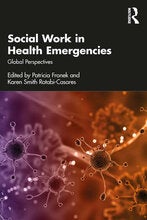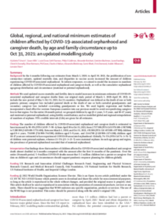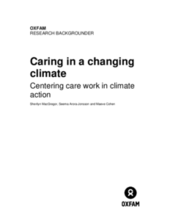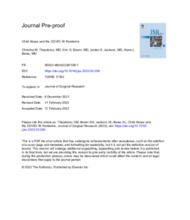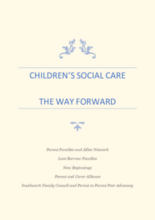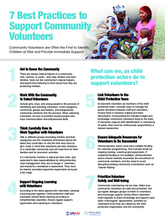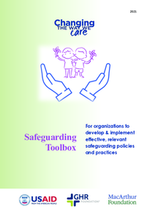Displaying 271 - 280 of 1343
This is the first comprehensive book that provides accessible, international knowledge for practitioners, students and academics about social work in health emergencies and spans fields of practice across world regions with particular reference to the COVID-19 pandemic. The book is relevant to a wide range of audiences, including practitioners, educators and students in social work, human services, international development and public health, as well as policy makers and researchers.
At least 5 million children have lost a parent or caregiver due to #COVID19 since March 2020, updated figures suggest. The authors urge actions to prioritise affected children, incl. economic strengthening, enhanced community and family support, and education.
The aim of this report is to fill a knowledge gap by examining the points of interaction between climate change impacts and the amount, distribution, and conditions of unpaid care work. We focus on care workers rather than those who are cared for, while stressing the relational nature of care and acknowledging
that carers too require care.
The COVID-19 pandemic had widespread effects, including enhanced psychosocial stressors and stay-at-home orders which may be associated with higher rates of child abuse. The researchers aimed to evaluate rates of child abuse, neglect, and inadequate supervision during the COVID-19 pandemic.
In the BBC interview below, parent activist Taliah Drayak presents key findings from the report: Children’s Social Care: The Way Forward. She describes her family’s own nightmare when social workers removed her two-year-old from her custody.
This report is based on consultations with parents and allies in England carried out by Parent Families and Allies Network; Love Barrow Families; New Beginnings; Parent and Carer Alliance; and Southwark Family Council and Parent to Parent Peer Advocacy. It sets out ideas on making the care system more supportive, humane and inclusive, and ensuring families’ needs are met early, with advocacy as a core feature. It also argues for immediate changes, led by parents and children with lived experience of social care.
This Lumos working paper examines the relationship between education and institutional care and the fact that many children – especially those who are most vulnerable – can only access education in residential settings, settings which share similar harmful characteristics with institutional care settings.
A poster for Child Protection teams to emphasize the evidence based practices of engaging volunteers that were documented in the research.
This toolbox can be used by organizations working with and for vulnerable children and adults, particularly those at risk of separation or living in alternative care. It can support those in the organization who are responsible for:
• Developing and implementing safeguarding policy and procedures
• Assessing safeguarding risk
• Safeguarding in program development and implementation
This video by the Alliance for for Child Protection in Humanitarian Action details the main reasons for investing in child protection prevention programming in humanitarian crises.

